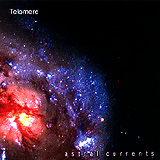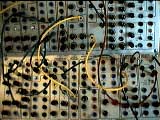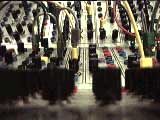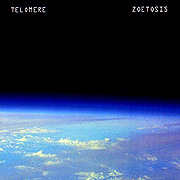| Profile: Telomere | |
| Chris MacDonald releases music under the name Telomere. His first two albums,
STAR'S END host | |

|
STAR'S END: You work under the name Telomere. What is the meaning of this word?
Chris MacDonald: Telomere is a biological term which refers to (as I understand it, I'm not a biologist) structures in a cell that control its life span. Scientists are theorizing that the understanding of these structures could have implications for human aging and cancer research. To be honest though, a lot of the appeal for me was in the sound of the word, not necessarily a strong association with the concept (although it is fascinating). It sounds strange I guess but to me outer space, inner space, the oceans and forests and all the life they contain, and even the space inside our minds are all somehow associated and related and they all make sense in the context of space music. STAR'S END: Give some insight into the name you've chosen to title your second album Zoetosis. Chris MacDonald: I came up with the word "Zoetosis" to go along with the general theme of the CD, with the prefix "zoe" meaning "life" and "tosis" to stand for "process". So the concept I had in mind was "the process and progression of life". The naming of the tracks and themes of the music were created with the idea of (gently) suggesting the theme of life awakening and blossoming on a planet. I imagined the songs covering a period of time from the first microscopic fragments of life coalescing, through to the blossoming of the world's first plants and animals. Of course that's just one journey that I happened to have in mind. It would be even better to me if listeners found their own story in the music!
STAR'S END: I've been intrigued with modular synths (including the Serge) for quite some time. how much of the music on
Chris MacDonald: STAR'S END: How much of an influence does this instrument have on your music? How important is this synth to your music and the compositional process? Chris MacDonald: I'd say the Serge is important, but not absolutely essential. The basic "modularness" is one part of it. The interface causes me to create sounds differently. Envelopes aren't always triggered for each note, the lack of a keyboard causes me to find different ways to build up a thicker sound, without MIDI I end up "performing" each patch manually as it is recorded by moving knobs or whatever.
I think the Serge filters are fairly unique and add to the sound. The VCQ is very smooth and organic with a great resonant sound. The phaser module sounds great to my ears. The most common envelope generators STAR'S END: While on the subject of composing, do you envision a piece fully before you begin to record the music? Please tell me about your approach. Chris MacDonald: I often hear a song or ambiance in my head first and try to recreate it. Or I have a story or journey that I want to try to evoke. But the timbres I hear are elusive and the recording process so slow that I often end up with something different than I first imagine. I overdub many layers since the song can't come out of the synth fully-formed in one patch. So each layer is a struggle to find a patch that sounds good and complements the existing material, and then recording a good performance of the patch. I sometimes spend hours patching the synth, searching for the sound that I am imagining, only to wind up with nothing. Very frustrating! I do try to start with a guide track, one patch that forms the core of the entire song, and build up "detail" from there. This is easier than starting with just one of several main themes, then adding the other themes, and then finishing with the detail. Often I have to do that though if the timbres are very different. Also, I occasionally start a song with a technical idea, imagining what a certain patch might sound like. This is more difficult to turn into a full song, so a lot of arranging on the fly is needed. STAR'S END: How much is left to chance or improvisation? Chris MacDonald: Hmm, well it doesn't really feel like improvisation at the time, because I usually have some sound in mind ahead of time. The two problems though are realizing that sound to my own satisfaction and avoiding becoming distracted on a tangent while trying to find the sound. Failure of the first often leads to the second. So I guess this is where the chance and improvisation come in. STAR'S END: Are you a fan of space music? Do you collect music? Chris MacDonald: I am a fan, but I don't buy many CDs unfortunately. I don't have as much time to listen to music as I would like. Also, my taste in space music is somewhat narrow I am embarrassed to say. I hear a lot of music that sounds fine to me, but doesn't have some quality that makes me want to listen to it many times. It's a bit of a curse really. I have a friend who is a voracious collector of music. He loves everything! I am a bit jealous. :-) I do listen to other styles of music too, rock from the 60's through present, a little classical, blues once in a while.
STAR'S END: When i listen to your music, I am reminded of the early music of
Chris MacDonald: Oh absolutely. STAR'S END: In places on Zoetosis I hear slight rhythms. Is this an area you are interested in exploring? Chris MacDonald: Yes I would like to try more "synchronized" music. The way I record makes it a bit difficult, no synch track or MIDI. I am a bit concerned about too much of this though, as I worry that it will take away the organic feel of the music. I often try to synchronize performances manually, but other times I like having sequences running freely against each other. STAR'S END: Do you ever play out live? Chris MacDonald: I would like to, but I haven't figured out a way to do it yet. Just myself with a single patch on a modular can't recreate the sound of a whole song, unless it were a really big modular I suppose. But re-patching live would be difficult in any case. I have been thinking about ways to do it though. Perhaps using long delays with infinite repeats to build up layers of sound, like Fripp or Eno I guess. Maybe devising some "standardized" patches that could be modified and re-used over the course of a performance. Or rely more on keyboard synths. Or try to find other musicians to play with live. STAR'S END: Is there a live scene in your area? Have any opportunities presented themself to you?
Chris MacDonald: I live in the STAR'S END: What about the emotional side of your art? Why does electronic music lend itself best to realizing your purpose? Chris MacDonald: One level that I would like for the music to be effective on is in creating an environment where the listener can construct a unique state of mind, visualize a place or take a mental journey that is beneficial to them. The abstract nature of this kind of electronic music is conducive to that goal I believe. By reducing the use of strongly literal musical themes like a simple repeated melody, lyrical vocals, or aggressive rhythms, the music can (hopefully) become suggestive of many different spaces, emotions, or ambiances. Then the listener is free to build their own journey with the guidance of the music, rather than merely receiving the single, literal message of the composer. STAR'S END: What do you draw on outside of music to create your works? Chris MacDonald: I try to get outside and experience nature as much as possible. Although a long trip to some exotic place can be amazing, I also find that just walking along the water near home and taking in the life around me is very rejuvinating. I live in a suburban area which I think can be very isolating, so I have to make an effort to escape when I can. On the other hand, I like all things space and science as well. Wandering through the picture archives of NASA and the Hubble telescope is very inspiring to me. STAR'S END: I find your music really deep. what does realizing these wonderful soundscapes do for you? Chris MacDonald: I think that the best thing is learning that others are enjoying and benefiting from the music. A few people have written to say that the albums have become part of their life, which is very humbling to me, and a great honor. Beyond that, I really enjoy the process of creating the music, even though there are times when it is difficult. There is a sense of accomplishment when a song is finally completed. Although, I have usually been "inside" the song for so long that it is quite a while before I can listen objectively. Listening to a new piece of music for the first time can be a wonderful event, it's too bad that musicians never get that experience with their own music! STAR'S END: Do you have any contact or understanding of your audience? What is your hope for them? Chris MacDonald: I do get some letters and email, which is great. Getting feedback from the listeners really makes it worthwhile. I hope that there is enough depth to the music that they are able to continue to enjoy and find something new within it for a long time. Chuck van Zyl interviewed Chris MacDonald on or around 18 August 2001 |
Related Links:
| |
| Artists | |


